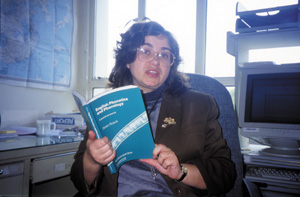 Online
Edition Online
Edition |
||||||||||||
Write to us Back to main |
Rewards gained from early learning By Flora Chan Phonetics is the study of the universal properties of the sounds of human speech. According to Prof. Joanna Radwanska-Williams, assistant professor in the English Department at The Chinese University of Hong Kong, there are different possible speech sounds in all languages. These speech sounds are summarised in the International Phonetic Alphabet. The IPA is a universal system of transcription based on the articulatory classification of speech sounds. It helps compare the pronunciations of different languages. “Evidence from the study of language acquisition suggests that language should be learned at the youngest possible age,?said Prof. Williams. “Earlier is better.?/font> Adults?brains and tongues have a strong use of their mother tongue. She said pronunciation habits are best acquired in childhood. Ms. Pamela Suen, an English teacher in Our Lady’s Primary School, agrees with Prof. Williams. Said Ms. Suen: “Younger students are more courageous to try. “Older students are afraid of trying again once they have pronounced incorrectly.?Prof. Evelyn Man is an assistant professor in the Department of Curriculum and Instruction in the Faculty of Education. She also agrees that students should learn phonetics in primary school. Prof. Man said that lower form students could learn a basic knowledge of phonetics, whereas higher form students could learn phonetic symbols. Prof. Williams pointed out that learning phonetics involves memorising some theoretical knowledge. However, according to some psychologists, young children have a very limited capacity for learning abstract concepts. At St. Francis Assisi’s English Primary School, there is an English week, organising activities to help student learn phonetics. “We have activities like tongue twisters, singing and poem composition during that week,?said Ms. Stella Fung, an English teacher in the school. All these activities encourage students to learn phonetics in a more interesting way. Prof. Man said that learning phonetics helps a lot in learning a second language. Said she: “When students don’t know phonetics, they just memorise the words. “However if they know phonetics, they will understand the relationship between a word and its sound. “They will be able to understand a word, not just remember it.? CDs and tapes are used in teaching phonetics. Said Ms. Suen: “In the past, we made notes by ourselves and taught students pronounciation by reading worksheets. “Now we are using books together with tapes and CDs. Teaching has become more effective and interesting.?/font> Learning phonetics helps students in other ways, too. “My students at Nanjing University were able to hear a word without knowing its meaning, transcribe it phonetically using the IPA, and ask me for its meaning,?said Prof. Williams. Said Ms. Fung: “After learning phonetics, students try their best to spell a word in the dictations, instead of just leaving it blank. “The biggest difference after learning phonetics is that students become more confident,?she said. However, there are drawbacks in teaching phonetics in schools. “We don’t have enough time to teach more about pronunciation,? said Ms. Suen of Our Lady’s Primary School. She said that they can spend only 15 minutes teaching one chapter of phonics. However, the book recommends about 45 minutes for each chapter. Ms. Suen said that the limited knowledge on the part of teachers also posed a problem. “For teachers who were not majors in English, they have to study phonetics all by themselves,?said Ms. Suen. “More training is needed for teachers,?she added.
|

|
||||||||||